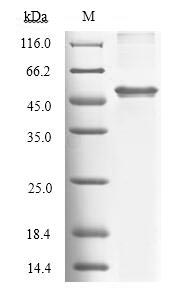In the production of recombinant Human TDO2 protein, the gene for TDO2 (Yeast) was cloned into a vector and expressed as TDO2 protein in Yeast. The plasmids with the copy of TDO2, or the expression vector, were often used to enhance gene expression. Every step of production was undergone with a strict QC system. N-terminal 6xHis tag was used in the process. The purity is 90% determined by SDS-PAGE.
TDO2, indoleamine 2,3-dioxygenase 1 (IDO1), and IDO2 are three enzymes that catalyze the amino acid tryptophan into kynurenine in the kynurenine pathway, which accounts for 95% of tryptophan catabolism. TDO2 is mainly expressed in the liver and exists in the brain, while IDO1 and IDO2 have wider tissue expression, including in peripheral blood and immune cells. TDO2 plays an important role in neurological diseases such as Alzheimer’s disease, Parkinson’s disease, and autism. TDO2 is expressed in several established human cancer cell lines, including glioblastoma, colorectal carcinoma, head and neck carcinoma, and gallbladder carcinoma cells. Overexpression of TDO2 promoted tumor cell survival and was correlated with tumor grade and poor prognosis in triple negative breast cancer and in brain tumors. Besides, expression of TDO2 has been reported in human colorectal cancer and leiomyosarcoma.






